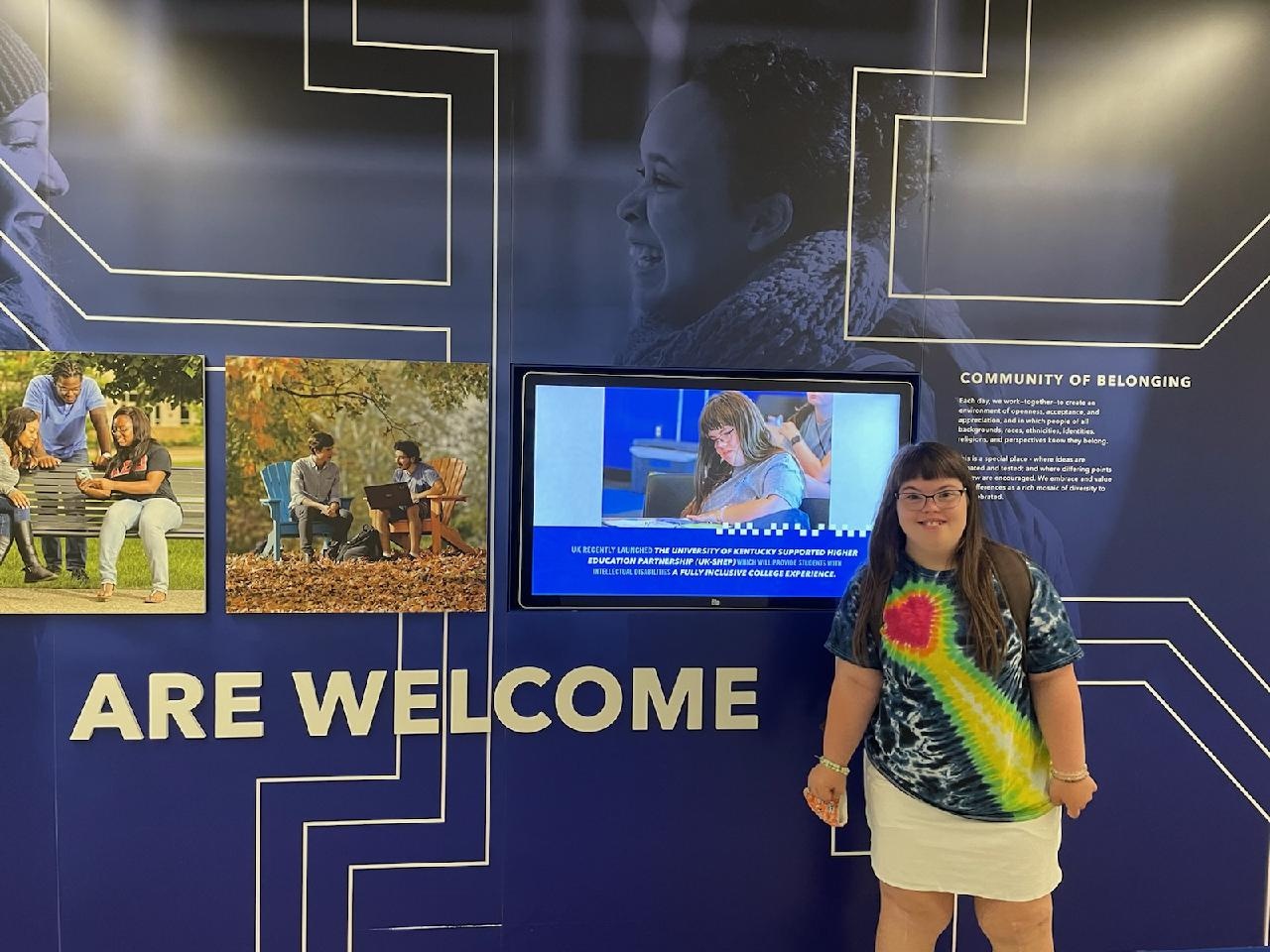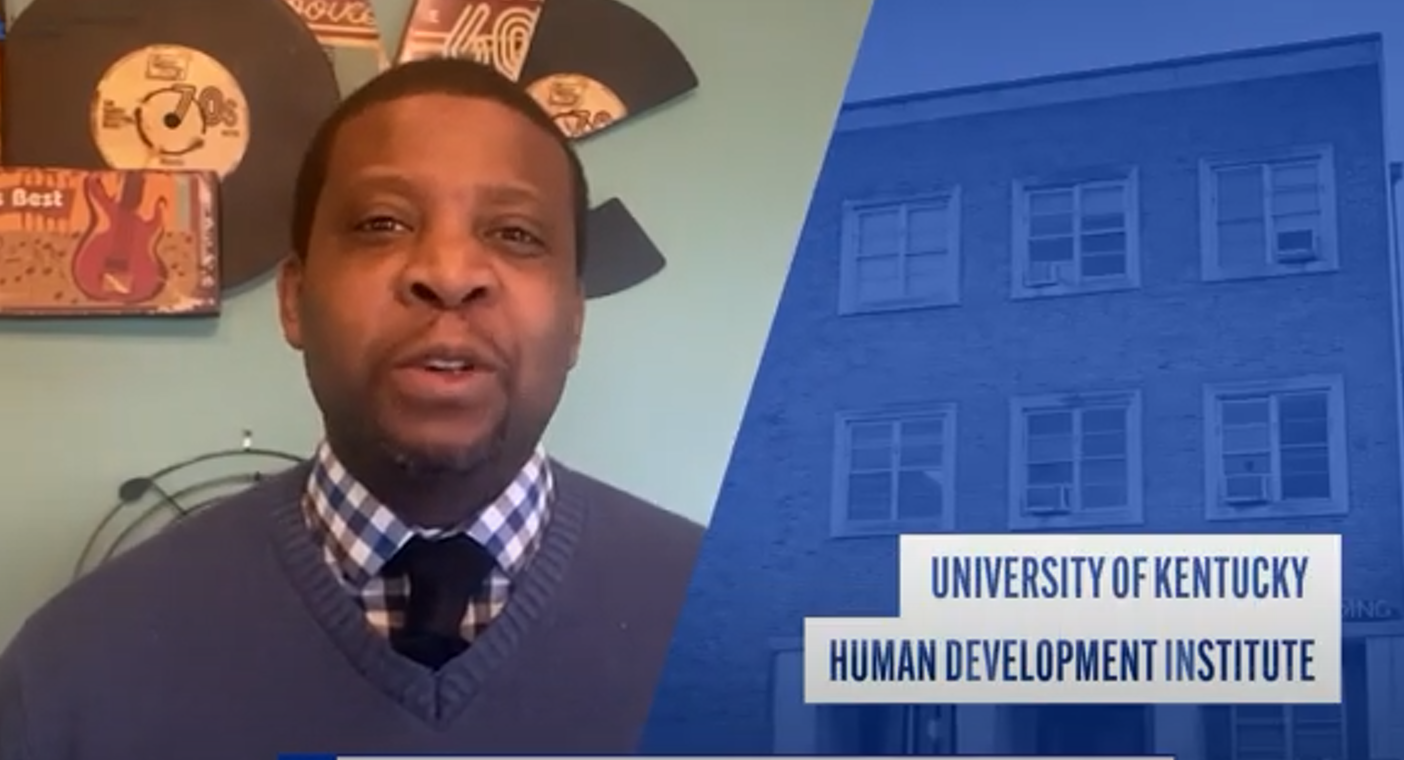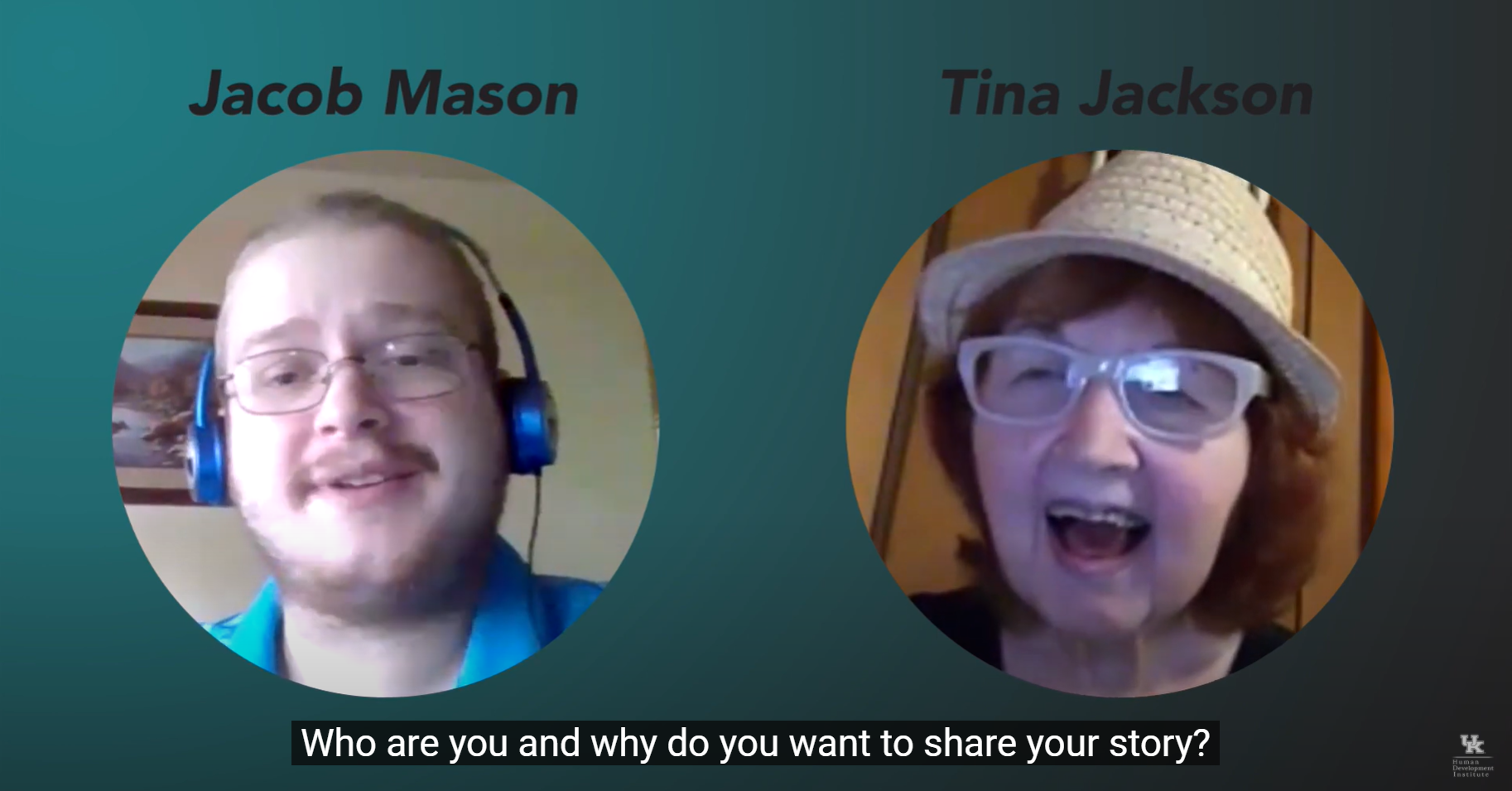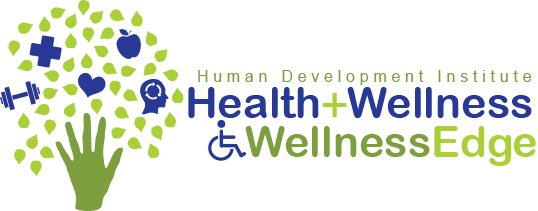Date: 9/7/2022
Description: Students with intellectual disabilities have been significantly underrepresented in higher education. Learn more about inclusive higher education programs supporting students with education and career goals.
Patti Singleton
Hi and welcome to the State of HDI podcast where we explore the projects and initiatives at the University of Kentucky Human Development Institute, a university center on disability. This is Patti Singleton; in the studio, I have Erin Fitzgerald, coordinator for UK’s College and Career Studies Program, a program for students with intellectual disabilities, as well as Johnny Collett, HDI’s Deputy Director.
Both Erin and Johnny work to enhance and expand inclusive higher education options for students with intellectual disabilities In Kentucky. Welcome to you both.
Johnny Collett
Thanks, Patti.
Erin Fitzgerald
Thank you.
Patti Singleton
All right. To start, can you tell us a little more about this HDI project?
Johnny Collett
Yeah, well, thanks for the opportunity to talk about this. The supported higher education project here at UK is focused on students with intellectual disabilities. So, students who have, you know, great strengths but also have some areas of challenge just like we all have. But students with intellectual disabilities have been significantly underrepresented in higher education. We know not only in Kentucky, but really across the country.
So we’re excited to be able to have a project that works with existing programs at institutions of higher ed. here in Kentucky, but also is working with other universities and colleges who are interested in starting programs, higher education programs for students with intellectual disabilities. We may get to talk about that a little bit more later, but it’s a – it’s a really cool opportunity to think about a group of students who have historically not been on our campuses and creating a program for them that is meaningful to them, meaningful to employers, we think, as they progress through the program.
But I would be remiss if I didn’t say that we are very grateful for the support of the Kentucky General Assembly. We have had this work included in Kentucky’s state budget for the last three budgets cycles, and that’s just a really pretty cool thing. And I think we’re leading the nation in a lot of ways because of that.
Patti Singleton
That’s great. And I know you touched on this a little bit, but can you tell us how are these programs unique?
Erin Fitzgerald
Yeah, I can speak to that a little bit. I think one thing that’s unique about CTPs is that they were created and designed specifically with students with intellectual disability in mind. And as Johnny said, that’s a demographic that’s been historically left out of the conversation about postsecondary education and which is a shame. And if – if institutions of higher education had originally been designed to be inclusive of all people, we might be looking at a different situation now, but I think things are definitely changing in this regard, and more people recognize that postsecondary education can and should include more people.
And when I say that CTPs are designed with students with ID in mind, I don’t mean that they have totally separate elements to them from existing programs and resources, but the programs exist to increase access and inclusion in those existing spaces. And I think one of the things important to think about is that students in CTP programs, students with intellectual disabilities come to college for much the same reasons as students coming to college for any other program or reason.
And that’s some of those things being like continuing learning and exploring interests and thinking about jobs and careers and just what you want to do in life. And so that’s – those are things that all students experience in college, whether they’re pursuing a degree or whether they’re there for a different kind of learning experience and focusing more on learning new things and meeting new people.
So CTP programs focus on all of those things, like the campus experience and connection with peers and exploring what might be next in life.
Johnny Collett
You know, I might add a little bit to that. Erin has mentioned CTP a couple of times, and that’s comprehensive transition in post-secondary programs. And I’m glad she mentioned that because I think that’s part of what makes these programs unique. The terminology comprehensive transition in post-secondary programs is a little clunky, but that’s because it’s in federal law, and that language is often a little clunky.
But it’s also one of the unique things about it. Way back in 2008, when the Higher Education Act was last reauthorized, I think, you know, the United States Congress deserves a lot of credit for saying, hey, if we’re going to talk about higher education for all Americans, let’s make sure that we’re talking about those who are conspicuously and significantly underrepresented in higher education.
So they carved out this opportunity for colleges and universities to start the so-called comprehensive transition in post-secondary programs. So these are programs we’re going to talk about our own program here at UK that Erin coordinates for us here in a few minutes. But that means that that programs like ours and we have several other across the state are also able to go through a process that the United States Department of Education reviews an application of a college university says, “hey, we want to start a program like this.” And there’s information that those schools have to provide to the U.S. Department of Education.
But then if they successfully move through that process, then the U.S. Department of Education approves their program. And that means that those programs at institutions of higher education can now offer financial aid to students who would have historically have, one – not been able to properly attend campus or school like other students.
But two – may not have had access to federal financial aid because maybe they went through a different type of program in high school, didn’t get a standard diploma or any diploma at all. But that barrier was removed in the Higher Ed Act back in 2008. So if you go through this process and are approved by the U.S. Department of Education, campuses and schools like the University of Kentucky can offer access to federal financial aid for which students may qualify based on demonstrated need.
But also in Kentucky, we’ll talk about this today or maybe a little bit later if you have us back. You know, students in these programs also qualify for their Kentucky Education Excellence Scholarship Program, our KEES funding, and also Work Ready Kentucky scholarship program and also the college access program. So there are many barriers that have been removed for this population of students in programs like this.
And I think that just adds to what helps to make it unique.
Patti Singleton
That’s fantastic, Johnny. And you mentioned the Reauthorization of 2008. I know HDI has been doing this work for a long time. Can you tell me a little more about that?
Johnny Collett
Yeah, I’m happy to do that. We have been privileged. It’s been our privilege here at the University of Kentucky Human Development Institute, I think to be leaders not only here in Kentucky, but across the nation in this work with a lot of other partners. But back in 2010, so I mentioned the reauthorization of the higher Ed back in 2008, a couple of years later, you know, regulations and other things kind of catch up to laws that have been passed.
And that’s when the opportunity to start these programs happened. And there was a little bit of funding that went along with that in that first round back in 2010. So Kentucky was very fortunate to receive some federal funding between 2010 and 2015 to help sort of build on some progress that we were already making here in Kentucky because of some commitments that we had long before this, but that federal money helped us in those first five years to get some programs up and going.
We currently have two of those that started back then that are still active. Northern Kentucky University got started sort of during that period of time. The program at Murray State University did as well. The program at Bluegrass Community Technical College also got started during that time. There were a couple other schools that had had a program and are active now and maybe we’re interested in, you know, kind of applying back then but didn’t get all the way through the process.
But at any rate, you know, we have been doing this this work for quite a while. That federal money dried up in 2015. We did not continue to receive that, and we did have some other funding and support from other partners. But, you know, we’ve largely been doing this without federal funding since then. But as I mentioned a few minutes ago, back in 2020, the Kentucky General Assembly included this money in the state budget.
And as part of one of the mandated programs we have at the University of Kentucky that not only helps us do the work we’re going to, we do the UK in our own program that we’ll talk about the few minutes, but helps us work with current programs to enhance those programs for students with intellectual disabilities and also work with interested colleges and universities that want to establish these types of programs.
Patti Singleton
That’s fantastic. So, Erin, tell me a little bit more about the UK College and Career Studies program.
Erin Fitzgerald
Okay. The College and Career Studies Program at UK – which is new this year and we’ve been developing it for that for a little while – is one of the ways that a CTP can look. I know that different colleges and universities have different approaches to how they do inclusive higher education programs. So this program at UK is focused on access and partnership.
And we’re we strive to build partnerships with the community, with the university and the community in order to ensure that students can access existing resources, as I mentioned before. So in this program CCS students – or college and career study students – start off taking classes that may help them get used to the college and campus environment and to think about their own ways of interacting with information and with others.
And we also are having conversations within our cohort of students and among peers where people can share about their strengths and interests and about what might be helpful during college in order to work toward their career goals and other life goals. So, it sort of starts out that way. And then after the first semester, students hopefully have a better snapshot of the college environment and are feeling more comfortable there.
So then students can make more decisions about what classes and work experience and other activities they may want to explore. And this program can be completed in about four semesters for students who are averaging six or seven credit hours per semester. And in three of those, students also engage in some sort of work experience. That’s a big part of the program.
So, this may be a volunteer activity or a work study or internship or practicum experience, and it can happen in a number of ways depending on the student’s schedule. But the idea is that each student in the program will get three semesters to explore those things, to get a better idea of what’s involved in certain jobs or career paths, and see if it may be something they want to continue or pursue in the future.
Patti Singleton
That’s fantastic. I’ve actually had one of the CTP students as an intern and practicum student and you know, her enthusiasm to have the opportunity to be in college and on campus has just been… I wish that we could bottle that. All right. So, tell me, what do you think project success looks like?
Erin Fitzgerald
Well, I think another thing that kind of speaks to that is another thing that we focus on, I think projects success looks like student success. So that’s going to be different for each student if we are able to successfully support students and the goals that they’re each working toward, then I think that shows project success. So one of the – in addition to my career – I know we talk a lot about career in college and those things are really important, but there are other elements too, just like there are a lot of other elements that college students learn, you know, are involved in the college experience.
So another thing that we focus on with our students is increasing self-advocacy and autonomy. So that’s both on campus and in life in general. And some students have said they wish to become more independent with certain things. And that’s definitely something all college students have in common. Doing more and more things on their own and making decisions that reflect that, making steps toward doing those things.
And so that’s important. I want to make a quick distinction between independence and autonomy, because independence is a really important thing, and we definitely want to help people achieve that as much as they would like. But as we all know, it’s also true that many people do need certain types of support and may continue to need certain supports through the lifespan.
And that’s okay. So not everything has to be done completely independently, but autonomy is more about making your own decisions and about your path in life and being the one at the helm of that and including which elements you feel you want to do independently and which elements you may want or need support and doing. And then the self-advocacy element is important in learning how to how to stand up for yourself so that you can make those wishes known and clear to other people.
So those things are all interconnected and we all – they’re all things that we talk about with the students as they’re navigating this program.
Johnny Collett
Yeah. And I think that’s perfect. And I’m thinking a little bit more as you ask the question, Patti, about success and what would that look like? You know, I started our conversation today with talking about the underrepresentation of this population of students in higher education. So, I think at least part of what success looks like also is systemic.
I think we’ve focused on the student aspect of success, which is the most important. But from a systems perspective, we want to think about where we are as a Commonwealth. You know, across our state. And we want to increase options for students with intellectual disabilities to attend programs like this and make sure that we’re addressing those access issues and giving students every opportunity to be successful and that we would have and continue to have a higher education system across the Commonwealth that is that is increasingly more welcome to all students, including students with intellectual disabilities.
So I think that’s also from a systems perspective kind of what, what success looks like. And I think we’re going to have lots of opportunities to talk about the growing success in Kentucky. These programs are about the student driven by the person center plans, their career interests and goals. And part of the goal is, is as it would be for any student in a program like a university program, and that is to better prepare for what a career looks like.
And for students with intellectual disabilities to better prepare for competitive, integrated employment and independent living. So you can see the connections to our broader issues of workforce in Kentucky are broader issues and concerns around economic development in Kentucky and how these students are just like any other Kentuckian, will contribute significantly to that as we move forward. And also a little bit of a teaser, I think you’re going to hear about more programs like this in Kentucky.
I mentioned that we have four that are active with ours here at the University of Kentucky being the most recent one. But without saying more than I’m able to say right now, I think in the coming months you’re going to hear about more programs. So, ask us questions if you have them. And let’s just continue to work together to increase the options and access and opportunity for success for students.
Patti Singleton
Well, that’s something that we’re certainly going to be watching for. And I thank you both for joining us today. In the episode notes are links to find out more about this project and also for Think College, which provides support nationally to support inclusive higher education.
Relevant Links:
- Kentucky Supported Higher Education Program https://kshep.hdiuky.org
- Think College www.thinkcollege.net
Podcast URL: https://hdiuky.podbean.com/e/episode-1-inclusive-higher-education-in-kentucky-supported-higher-education-project/



